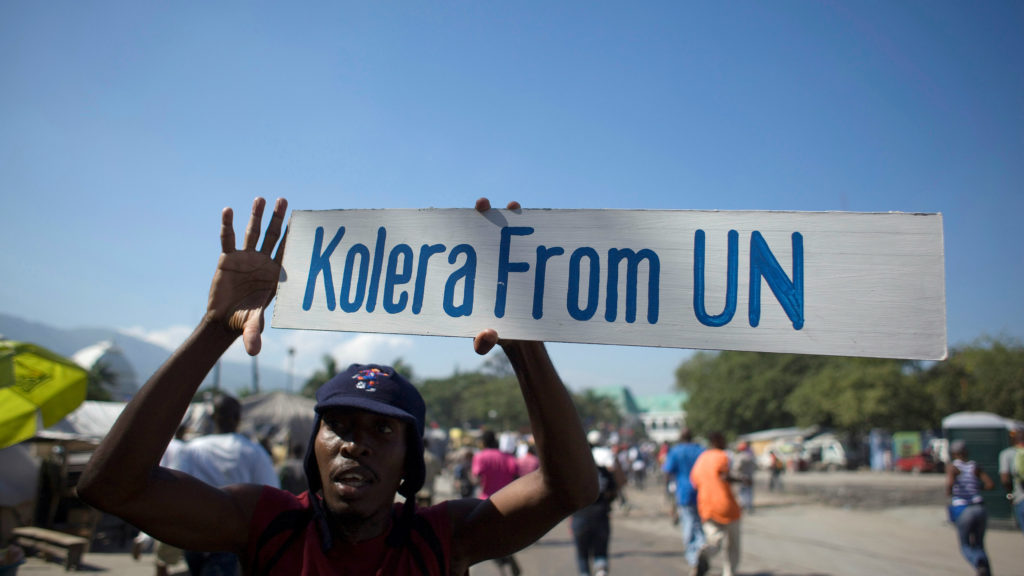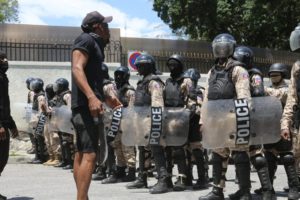
By Joyce Philippe
After nearly six years and immense public scrutiny, the United Nations finally admits its role in Haiti’s deadly cholera epidemic.
U.N. Deputy Spokesman Farhan Haq recently said in an email that “over the past year, the UN has become convinced that it needs to do much more regarding its own involvement in the initial outbreak and the suffering of those affected by cholera.” The formal statement by Haq stops short of taking complete blame for the incident, yet suggests that “new response will be presented publicly within the next two months”.
The first traces of cholera appeared in late 2010, just months after a devastating 7.0 magnitude earthquake killed over 200,000 people and displaced 1.5 million others. Experts say that until then, there was no record of the disease in Haiti for over 150 years. Foreign aid, donations, and volunteer missions poured in from all over with hopes of rebuilding Haiti from the ground up. While the United Nations sent its peacekeepers to lead recovery efforts, their presence resulted in more harm than good.
An 18-page audit report by the Office of Internal Oversight Services (OIOS) details the violations by U.N. peacekeepers that contributed to the spread of cholera. This information is vital, considering many of the peacekeepers visited shortly after a mission in Nepal, which at the time was suffering its own cholera outbreak. The document states that peacekeepers dumped poorly-treated sewage into Haitian public canals, left camps filled with garbage as toilets and septic tanks overflowed with human waste, and ignored water sanitation regulations, among other acts of negligence.
Cholera is a bacterial disease spread through contaminated food or water. As the waste began to trickle into the Artibonite River, a primary source of water for thousands across Haiti, the illness spread with a destructive force. According to the New York Times, the death toll stands at over 10,000 while at least 800,000 people are still sick. Symptoms include diarrhea, vomiting, and cramping. In severe cases, extreme dehydration and shock may occur. An article by National Geographic states, “If left untreated, 25 to 50 percent of cases can be fatal.”U.N. regulations and international treaties act as protection for the world organization, making it extremely difficult for it to be subject to legal action. Activists in 2013 sued the U.N. over the outbreak, but by 2015, their class-action lawsuit was dismissed due to their diplomatic immunity. However, some see the U.N.’s move toward accountability as a step in the right direction.
U.N. regulations and international treaties act as protection for the world organization, making it extremely difficult for it to be subject to legal action. Activists in 2013 sued the U.N. over the outbreak, but by 2015, their class-action lawsuit was dismissed due to their diplomatic immunity. However, some see the U.N.’s move toward accountability as a step in the right direction.
Beatrice Lindstrom, a staff attorney at the Boston-based Institute for Justice & Democracy in Haiti says “promises will not stop cholera’s killing or compensate for the damage to poor families in Haiti. The real test is in what comes next.”As thousands continue to suffer from the effects of cholera, one thing is clear: the work toward establishing an effective and sustainable solution has only just begun.
As thousands continue to suffer from the effects of cholera, one thing is clear: the work toward establishing an effective and sustainable solution has only just begun.


























![Bring the Caribbean to your kitchen.
Discover bold, time‑saving flavor with Épis of Haiti spice blends—perfect for authentic island dishes or a vibrant twist on your favorites. Taste tradition, transform your cooking. [ @episofhaiti ]
Explore the full collection at episofhaiti.com
#AD #lunionsuite #haitianamerican #episofhaiti](https://scontent-lga3-2.cdninstagram.com/v/t51.75761-15/491432320_18506758480023307_6411904492707133407_n.jpg?stp=dst-jpg_e35_tt6&_nc_cat=109&ccb=1-7&_nc_sid=18de74&_nc_ohc=mg9gOnjwWSMQ7kNvwHmwuoi&_nc_oc=AdnLNy2-7vf5do1dbVcTviEujqlBywo5qZEsDvrjqIUKPK8B30RjrhBkQIPsoMb2IJc&_nc_zt=23&_nc_ht=scontent-lga3-2.cdninstagram.com&edm=AM6HXa8EAAAA&_nc_gid=NVeEaWyDJH1eExpt_6QDzQ&oh=00_AfHRwezMS76qbYiMg7ShaUMoozzQXEtndPShLpysZnY34w&oe=6811C3D1)



